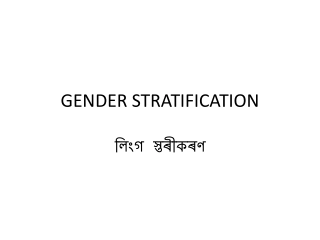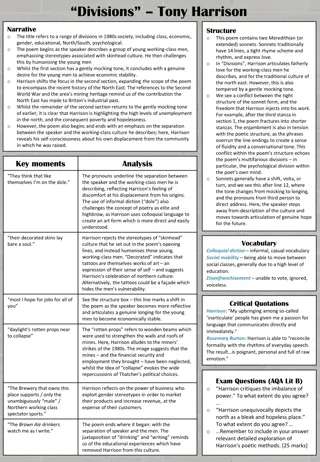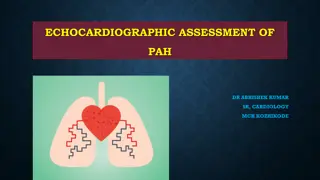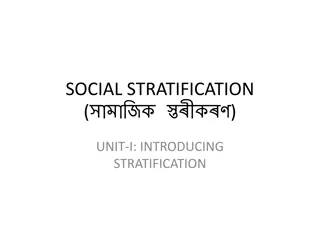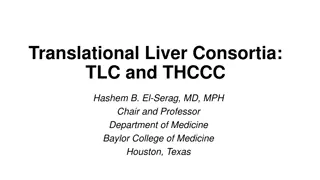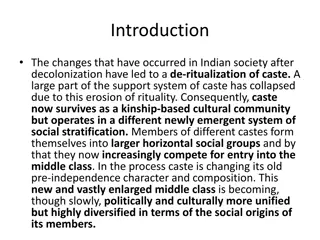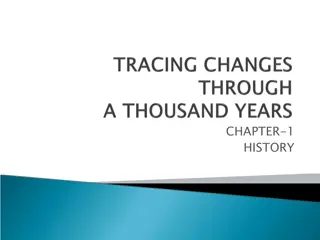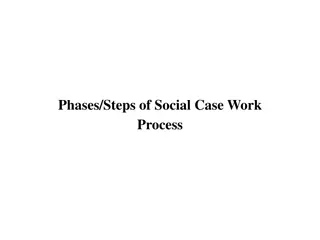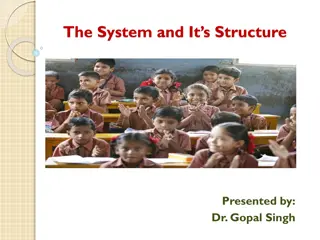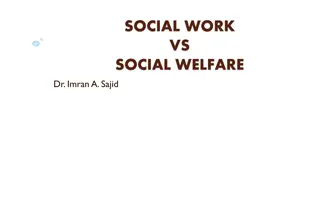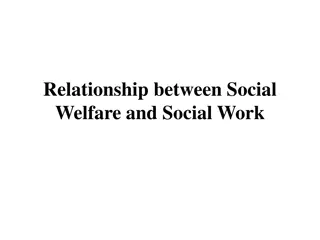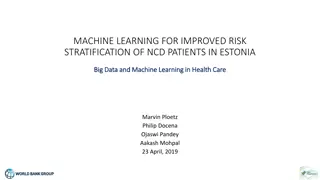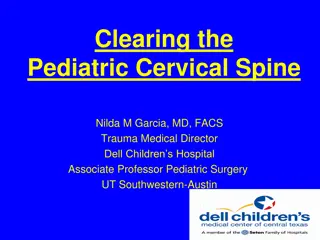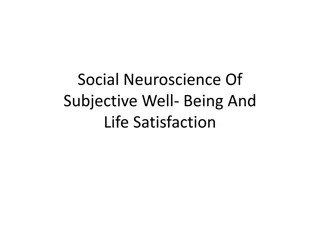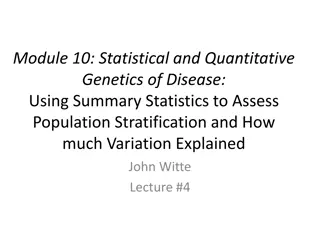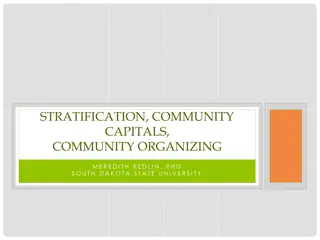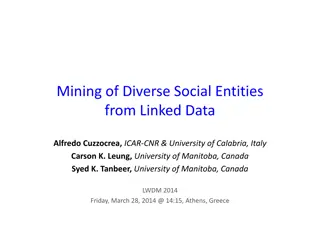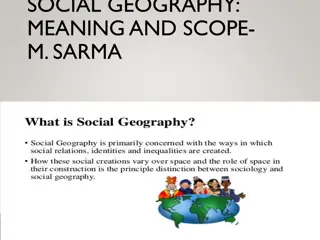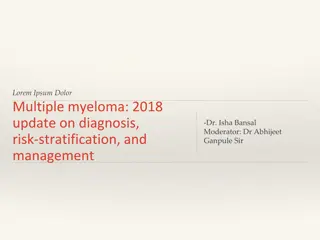GENDER STRATIFICATION
Gender stratification involves the social ranking where men typically occupy higher statuses than women, leading to gender inequality. Feminist theory extends feminism into theoretical discourse to analyze and critique gender roles, inequalities, and patriarchy. Conflict theory is used to examine th
7 views • 8 slides
Divisions in Society: A Narrative of 1980s Britain
The poem "Divisions" by Tony Harrison explores the societal divisions in 1980s Britain, touching on class, economic disparities, gender roles, educational differences, regional disparities, and psychological divisions. Through its structure, diction, and themes, the poem delves into the complexities
1 views • 7 slides
ENGLISH PHRASEOLOGY.THE ENGLISH VOCABULARY STRATIFICATION.
Explore the concept of phraseological units, various classifications, categorial features, and semantic relations in phraseology, along with the stylistic stratification of the English vocabulary, covering literary words, colloquial words, and different types of word combinations. Discover how phras
5 views • 22 slides
Substance Use Screening Tools in Pregnancy: SURP-P
The Substance Use Risk Profile Pregnancy (SURP-P) is a screening tool to assess substance use during pregnancy. It involves questions about marijuana smoking, alcohol consumption, and perceived need to cut down on substance use. Scoring determines low, moderate, or high risk levels. A brief assessme
4 views • 6 slides
Echocardiographic Assessment of Pulmonary Arterial Hypertension (PAH) Overview
Echocardiographic assessment plays a crucial role in the diagnosis, management, and prognostic evaluation of pulmonary arterial hypertension (PAH). This condition is characterized by elevated mean pulmonary arterial pressure and pulmonary vascular resistance, leading to various clinical features suc
6 views • 43 slides
SOCIAL STRATIFICATION
Social stratification categorizes individuals based on factors like wealth, education, and power. Caste systems, as seen in India, are closed and ascribed by birth, while class systems are open and based on achievement. This comparison highlights the differences between the two systems and their imp
4 views • 5 slides
Davis & Moore Theory on Social Stratification
The Davis-Moore theory argues that social inequality is necessary as it motivates talented individuals to fulfill crucial roles in society. They believed in meritocracy and unequal rewards to incentivize individuals to pursue important roles. The theory emphasizes that society rewards talent and har
3 views • 8 slides
Social Entrepreneurship, Social Enterprise, and Social Innovation
Social entrepreneurship involves creating sustainable social impact, social enterprises address challenges in critical needs sectors, and social innovation focuses on developing effective solutions to social and environmental issues. These concepts emphasize creating social value while engaging with
2 views • 19 slides
Overview of Reservoir Fisheries and Aquaculture in India
Reservoir fisheries play a vital role in India's aquaculture sector, with over 19,000 reservoirs covering millions of hectares. These manmade impoundments serve various purposes like irrigation and power generation. The reservoirs are classified into small, medium, and large categories based on thei
1 views • 28 slides
Gender Stratification and Its Impact on Society
Gender stratification is the unequal distribution of rewards, power, and prestige between men and women in society, leading to disparities in access to resources and opportunities. Men are often favored over women, resulting in fewer females in influential positions and limited decision-making power
0 views • 8 slides
Translational Liver Cancer Research Initiatives
Translational Liver Consortia (TLC) and the Translational Hepatocellular Carcinoma Consortium (THCCC) led by Dr. Hashem B. El-Serag are focused on advancing research for early detection of liver cancer. The main objectives include patient stratification for liver cancer risk, surveillance in cirrhos
0 views • 25 slides
Integration Approaches of Propensity Scores in Epidemiologic Research
Propensity scores play a crucial role in epidemiologic research by helping address confounding variables. They can be integrated into analysis in various ways, such as through regression adjustment, stratification, matching, and inverse probability of treatment weights. Each integration approach has
0 views • 20 slides
Dynamic Risk Stratification in Thyroid Cancer Management
Dr. Matthew Beasley, a Consultant Clinical Oncologist, discusses the importance of Dynamic Risk Stratification in managing differentiated thyroid cancer. The process involves post-treatment monitoring through stimulated thyroglobulin (Tg) and neck ultrasound at specific intervals, aiding in determin
0 views • 16 slides
Evolution of Caste in Post-Colonial Indian Society
Changes in Indian society post decolonization have led to the de-ritualization of caste, resulting in a shift towards a kinship-based cultural community operating in a new system of social stratification. Secularization of caste has detached it from ritual hierarchy and aligned it with competitive d
5 views • 10 slides
The Importance of Social Skills for Mental Health Recovery
Social skills play a crucial role in how we communicate, interact, and form relationships with others. They are essential for personal, social, and professional success. Neglecting social skills can hinder mental health recovery, as they contribute to social recognition, acceptance, and building soc
3 views • 12 slides
Medical Social Work and Its Impact on Patient Well-being
Medical Social Work, also known as Health Care Social Work, plays a crucial role in addressing the social, physical, and psychological needs of patients. Through providing case work, after-care, and convalescence services, Medical Social Workers contribute to reducing hospital readmissions, preventi
0 views • 12 slides
Historical Developments from 700 to 1750
The study of history between 700 and 1750 presents a vast array of challenges due to the diverse technological advancements, cultural shifts, and societal changes that occurred during this period. Historians rely on a variety of sources, such as coins, inscriptions, and manuscripts, to understand th
0 views • 11 slides
Objectives and Importance of Social Legislation for Social Workers
Social legislation is inspired by the constitution and aims to remove discrimination, safeguard rights of vulnerable groups, and eradicate social evils. It plays a crucial role in social welfare by providing a legal basis for addressing societal issues, enhancing community well-being, and facilitati
1 views • 4 slides
Phases and Steps of Social Case Work Process
Social case work process involves three main phases: Social Study, Social Diagnosis, and Social Treatment. The Social Study phase focuses on acquiring facts about the client's situation, while Social Diagnosis involves the professional opinion of the case worker towards a solution. Social Treatment
1 views • 7 slides
Overview of Education System in India: Structure, Advantages, and Drawbacks
Education system in India comprises various types of schools and institutions, each catering to different affiliations. The instructional structures and stratification focus on quality, equity, and management, with key institutions like NCTE and NCERT shaping education policies. Despite advantages l
0 views • 85 slides
The Difference Between Social Work and Social Welfare
Social work and social welfare are often used interchangeably, but there are distinct differences between the two. Social work involves highly trained professionals providing services to individuals and communities in need, using problem-solving methods. On the other hand, social welfare focuses on
0 views • 9 slides
The Relationship Between Social Welfare and Social Work
Social welfare and social work are interconnected concepts aimed at enhancing societal well-being. Social welfare refers to a nation's system of programs and services meeting essential needs, while social work involves professional activities supporting individuals and communities in achieving socia
1 views • 6 slides
Machine Learning for Improved Risk Stratification in Health Care
Explore the use of machine learning for risk stratification of patients with non-communicable diseases in Estonia. This study showcases the application of big data and machine learning in healthcare, emphasizing the benefits of personalized care, proactive disease prevention, and efficient intervent
1 views • 77 slides
Maternal Medical Home at Women's Health Center of Southern Oregon
The Maternal Medical Home at Women's Health Center of Southern Oregon aims to improve birth outcomes by providing comprehensive care for pregnant women, focusing on collaboration, education, and outreach. The center coordinates a team of providers to meet the unique needs of each woman during her pr
0 views • 14 slides
Evaluation of Risk Stratification Schemes for Ischaemic Stroke and Bleeding in Atrial Fibrillation Patients
A study conducted in Sweden on 182,678 patients with atrial fibrillation aimed to investigate risk factors for stroke and bleeding. The research assessed the application of CHA2DS2-VASc and HAS-BLED schemes for stroke and bleeding risk evaluations. Data from the Swedish Atrial Fibrillation cohort st
3 views • 20 slides
Social Economy and Innovation in Emilia-Romagna Region
Emilia-Romagna Region in Italy highlights the importance of social economy and innovation for sustainable development. Various initiatives such as Social Cooperatives and Voluntary Associations contribute to the region's social well-being. The focus on social values and not-for-profit activities dri
2 views • 15 slides
Social Skills Development in Students
Explore the reasons behind students lacking social skills in school settings and analyze the challenges some face even after receiving social skills instruction. Discover the key social skills required for appropriate interactions and the importance of social competence for overall well-being. Delve
0 views • 64 slides
Citizenship and Immigration in Modern Democracies
Citizenship, a fundamental institution of modern democracies, defines the relationship between individuals and the state through reciprocal rights and duties. However, citizenship has a dual nature, serving to both include certain individuals as citizens and exclude others. Immigrants residing withi
0 views • 21 slides
Pharmacotherapy for Non-Alcoholic Fatty Liver Disease: An Updated Review by Anita Eftekharzadeh
This comprehensive review discusses the pharmacotherapy options for Non-Alcoholic Fatty Liver Disease (NAFLD), covering topics such as sub-classification of NAFLD, proposed risk stratification, non-invasive measures for assessing liver fibrosis, and the NAFLD Activity Score (NAS). Anita Eftekharzade
0 views • 44 slides
Utilizing Replicate Estimate (Repest) for PISA and PIAAC Data Analysis in Stata
Explore how to use the Stata routine Repest for complex survey designs, accommodating final weights, replicate weights, and imputed variables in PISA and PIAAC data analysis. Learn to install and apply Repest to compute means of variables while accounting for sampling variance, clustering, and strat
2 views • 28 slides
Pediatric Cervical Spine Evaluation and Clearance - Comprehensive Review
This informative content delves into the significance, assessment, and clearance of pediatric cervical spine injuries, emphasizing the stratification by age groups and the importance of early evaluation. It highlights the need for spinal clearance in all trauma patients, discusses the immobilization
0 views • 21 slides
High-Sensitivity Cardiac Troponin in Stable Ischemic Heart Disease
Study by Nicholas Marston, MD, and team shows that high-sensitivity cardiac troponin at any detectable concentration is linked to a higher risk of major cardiovascular events in patients with stable ischemic heart disease. The research, conducted through the PEGASUS-TIMI 54 trial, aimed to further u
0 views • 17 slides
Social Neuroscience: Exploring Human Sociality and Well-Being
Social neuroscience delves into how the brain processes social interactions and their impact on human well-being. It focuses on the interconnectedness between social connections and overall life satisfaction, suggesting that humans are inherently social beings with a strong need for social belonging
3 views • 21 slides
Social Entrepreneurship and Social Inclusion in Bulgaria
The development and implementation of social entrepreneurship practices in Bulgaria aim to promote social inclusion through the development of the social economy. The focus is on combining economic results with social objectives, managed transparently with measurable, positive financial value. Vario
2 views • 12 slides
Statistical and Quantitative Genetics of Disease: Understanding Population Stratification
This lecture explores the use of summary statistics to assess population stratification and the impact of LD on association studies in statistical and quantitative genetics. It delves into LD scores, genomic inflation, polygenic inheritance, and separating SNP heritability from population stratifica
1 views • 29 slides
Community Capacities and Striving for Equity
Exploring the dynamics of stratification, diversity, and capital assets in communities, emphasizing the importance of addressing inequalities. Implementation strategies such as community organizing and environmental group actions are discussed to promote sustainable development and social well-being
0 views • 18 slides
Migration Costs and Policy Interventions
Much anecdotal evidence suggests high and rising migration costs, highlighting the need for comprehensive research to identify areas for policy intervention. This study aims to provide reliable evidence on low-skill workers' actual costs of migration, enable cross-country comparisons, and estimate n
0 views • 24 slides
Diverse Social Entities Mining from Linked Data in Social Networks
This research focuses on mining diverse social entities from linked data in social networks using a DF-tree structure and DF-growth mining algorithm. The study explores the extraction of important linked data in social networks and the mining of various social entities such as friends. Prominence va
0 views • 13 slides
Social Geography: Meaning, Scope, and Differences
Social geography is a branch of human geography focusing on social structures, groups, and activities. It examines the spatial arrangement of social phenomena, social differences, and patterns in understanding socially defined population groups. The scope of social geography includes analyzing spati
0 views • 25 slides
Update on Multiple Myeloma: Diagnosis, Risk Stratification, and Management in 2018
Multiple myeloma is a significant hematologic malignancy with varying stages of progression. From the asymptomatic MGUS to the more advanced SMM, early diagnosis and risk stratification are crucial. The presence of myeloma defining events, specific biomarkers, and established criteria guide the diag
0 views • 40 slides
